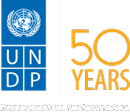Over the next two years, UNDP aims to restore livelihoods, social cohesion and security, reflecting a minimum of conditions necessary for resilience while focusing on the community level.
Initiatives will be implemented by community organizations, public services and institutions, private sector, civil society organizations. Building their ability to deliver basic services will be a critical part of UNDP activities in Yemen.
The collaborative and mutually reinforcing interventions between communities and local institutions will form the foundations of local governance that will be a building block in future recovery and state building. In this regard, our priorities for Yemen are:
Supporting a Peaceful Solution. UNDP leads a so-called track II dialogue process between midlevel community leaders, aiming at building confidence and trust among key political leaders and other stakeholders. Creating a fertile soil for strong social relationships as well as building consensus around mutual interest-based issues and pressing needs will enhance the sustainability of peace processes, and supports official and nonofficial political negotiations.
Economic Recovery. UNDP is now helping youth, women and communities restore lost livelihoods and income while responding to community needs. In partnership with NGOs, local authorities and communities, social businesses are sprouting up or are in the making for waste collection, solar power charging, cooking gas selling, water provision, ironing services using coal irons, and midwivery services.
Restoring Basic Services. While strengthening government and private sector capacity will be key for supporting humanitarian response efforts and preparing for recovery, the main focus of UNDP will be working with communities and local authorities to restores critical services such as waste management, civil registration, improve community security and dispute resolution.
Preparing the Ground. As part of humanitarian early recovery efforts, UNDP is supporting mine action activities including clearance of UXO, clearing of critical social infrastructure as well as assistance to victims.
Safeguarding human rights. UNDP is training non-governmental and civil society organizations in human rights reporting and psycho-social support.
Empowerment of vulnerable groups: Women, youth, minorities, disabled and displaced people are disproportionally affected by the conflict and will be the focus of UNDP interventions.
The challenges of Yemen’s war and crisis are unprecedented. In light of the intricate linkages between political, security, development and humanitarian dimensions, UNDP will work closely with the UN system, Yemeni stakeholders and international partners to deliver a risk-informed and conflict-sensitive resilience programme.






























